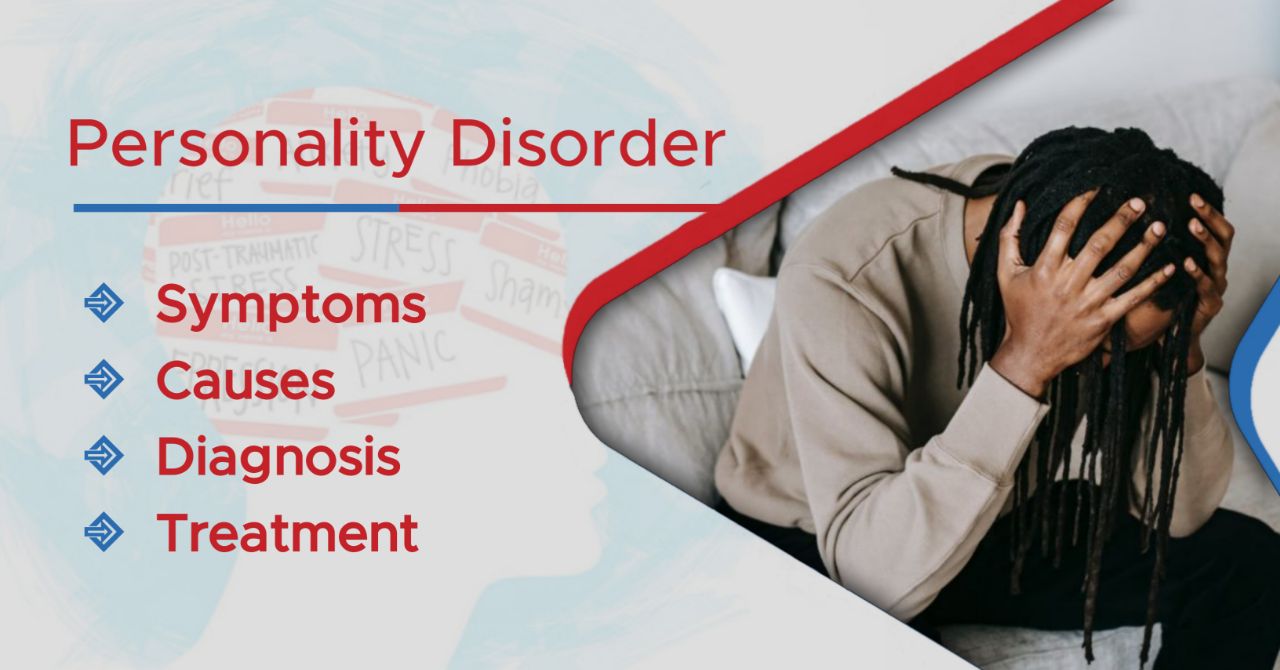
Personality Disorders
Reading Time: 5min
What are Personality Disorders?
Table of Contents
A personality disorder is a long-standing, pervasive, and inflexible pattern of thinking, feeling, and behaving that deviates markedly from the expectations of an individual's culture. This pattern is:
Stable and enduring: It begins in adolescence or early adulthood and is consistent over time.
Pervasive: It affects multiple areas of life, including how a person relates to themselves and others, manages emotions, and controls impulses.
Inflexible and maladaptive: The patterns are rigid and lead to significant distress or functional impairment.
Personality disorders are not just "quirks"; they are deeply ingrained and cause real suffering for the individual and those around them.
The Three Clusters
Personality disorders are grouped into three clusters based on descriptive similarities.
Cluster A: Odd or Eccentric Disorders
Paranoid Personality Disorder: A pattern of distrust and suspiciousness, interpreting others' motives as malevolent.
Schizoid Personality Disorder: A pattern of detachment from social relationships and a restricted range of emotional expression.
Schizotypal Personality Disorder: A pattern of acute discomfort in close relationships, cognitive or perceptual distortions, and eccentric behavior.
Cluster B: Dramatic, Emotional, or Erratic Disorders
Antisocial Personality Disorder: A pattern of disregard for, and violation of, the rights of others. Lack of empathy and remorse. (Often linked to conduct disorder in childhood).
Borderline Personality Disorder (BPD): A pattern of instability in interpersonal relationships, self-image, and affects, and marked impulsivity. Intense fear of abandonment, chronic feelings of emptiness, and unstable emotions are key features.
Histrionic Personality Disorder: A pattern of excessive emotionality and attention-seeking.
Narcissistic Personality Disorder (NPD): A pattern of grandiosity, need for admiration, and lack of empathy.
Cluster C: Anxious or Fearful Disorders
Avoidant Personality Disorder: A pattern of social inhibition, feelings of inadequacy, and hypersensitivity to negative evaluation.
Dependent Personality Disorder: A pattern of submissive and clinging behavior related to an excessive need to be taken care of.
Obsessive-Compulsive Personality Disorder (OCPD): A pattern of preoccupation with orderliness, perfectionism, and mental and interpersonal control, at the expense of flexibility, openness, and efficiency. (Note: OCPD is distinct from OCD, which is not a personality disorder).
Common Symptoms and Impact
While symptoms vary widely, they often manifest in:
Distorted Thinking Patterns: Inaccurate perceptions of self, others, and events.
Problematic Emotional Responses: Emotional reactions that are inappropriate, intense, or poorly regulated.
Impulse Control Issues: Difficulty controlling behaviors, leading to self-harm, substance use, or reckless actions.
Interpersonal Difficulties: Inability to form and maintain stable, healthy relationships, often leading to intense and chaotic conflicts.
The impact can be severe, including social isolation, occupational failure, co-occurring mental illness (like depression and anxiety), substance abuse, and a high risk of self-harm and suicide.
Causes and Risk Factors
The development of personality disorders is complex and involves an interplay of:
Genetics: Heritability plays a significant role, with certain traits and vulnerabilities being passed down.
Brain Biology: Differences in brain structure and function, particularly in areas regulating impulse control and emotion, have been observed.
Environmental Factors: Childhood trauma, abuse, neglect, unstable family life, and invalidation are strongly correlated with the development of personality disorders, especially Borderline Personality Disorder.
Diagnosis and Treatment
Diagnosis is made by a mental health professional through comprehensive clinical interviews and assessment. It is often challenging due to the pervasive nature of the disorders and the individual's lack of insight into their own behavior.
Treatment is often long-term but can be highly effective. The primary modalities include:
Psychotherapy (The Core of Treatment):
Dialectical Behavior Therapy (DBT): Specifically developed for Borderline Personality Disorder, it teaches skills in mindfulness, distress tolerance, emotion regulation, and interpersonal effectiveness.
Cognitive Behavioral Therapy (CBT): Helps identify and change core dysfunctional beliefs and patterns of thinking and behaving.
Mentalization-Based Therapy (MBT): Focuses on improving the ability to understand one's own and others' mental states.
Schema Therapy: Integrates elements of CBT with other therapeutic models to address deep-seated, self-defeating life patterns ("schemas").
Transference-Focused Psychotherapy (TFP): A psychodynamic therapy that uses the relationship between patient and therapist to understand and change problematic patterns.
Medication:
There are no medications specifically approved to treat personality disorders. However, medications (like antidepressants, mood stabilizers, or antipsychotics) may be used to manage co-occurring symptoms such as depression, anxiety, or impulsivity.
Myths vs. Facts
Myth: People with personality disorders are "bad" or "manipulative" on purpose.
Fact: Their behaviors are often maladaptive coping mechanisms stemming from intense inner pain, fear, and a distorted worldview. They are typically a response to overwhelming emotions, not deliberate malice.
Myth: Personality disorders are untreatable.
Fact: This is a damaging misconception. While challenging, many people with personality disorders experience significant improvement in their symptoms and quality of life with proper, evidence-based treatment.
Myth: Borderline Personality Disorder is especially "difficult" or "hopeless."
Fact: BPD has an excellent prognosis with DBT and other specialized therapies. Many individuals achieve recovery and no longer meet the diagnostic criteria over time.
Myth: Someone with a personality disorder can just "snap out of it" if they try hard enough.
Fact: These are deeply ingrained patterns that are part of a person's fundamental sense of self. Change requires dedicated, long-term therapeutic work, not just willpower.
How to Support Someone with a Personality Disorder
Educate Yourself: Understanding the disorder reduces stigma and frustration.
Set Healthy Boundaries: Be clear, consistent, and firm about what behaviors you will and will not accept to protect your own well-being.
Encourage Treatment: Gently support their commitment to therapy.
Validate Their Feelings, Not Their Behaviors: You can acknowledge that their emotional pain is real ("I see you're really upset") without validating unhealthy actions.
Manage Your Expectations: Progress is often slow and non-linear. Celebrate small improvements.
Seek Your Own Support: Caring for someone with a personality disorder can be draining. Therapy or support groups for family and friends (like NAMI's Family-to-Family) can be invaluable.
Crisis and General Support Helplines
If you need immediate support or are looking into other specific issues, the following national helplines can be helpful:
Mental 360 Psychosocial Support Helpline: A national helpline for individuals in distress or in need of mental health support. https://mental360.or.ke/
Befrienders Kenya: Offers free and confidential support via phone, SMS, and WhatsApp for issues like suicide, depression, and abuse. Available Monday to Friday, 7 AM to 7 PM. https://findahelpline.com/countries/ke
NACADA Helpline (1192): A 24-hour toll-free helpline for issues related to alcohol and drug abuse https://blog.opencounseling.com/hotlines-ke/
Child Helpline Kenya (116): A 24/7 helpline to stop child abuse and provide a safe environment for children. https://blog.opencounseling.com/hotlines-ke/
How to Find the Right Support
Finding the right help is a process. Here are a few steps you can take:
Contact Directly: When you call or email an organization, you can ask them directly about their experience and approach to treating personality disorders.
Ask About Modalities: Inquire about the types of therapy they offer. Cognitive Behavioral Therapy (CBT) and Dialectical Behavior Therapy (DBT) are evidence-based approaches that are often used for personality disorders.
Consider Support Groups: Professionally facilitated support groups can provide a powerful sense of community and shared understanding, which is a valuable part of the recovery journey
Disclaimer: This information is a guide based on available public knowledge. Services and contact details may change. Always verify directly with the healthcare providers.
















